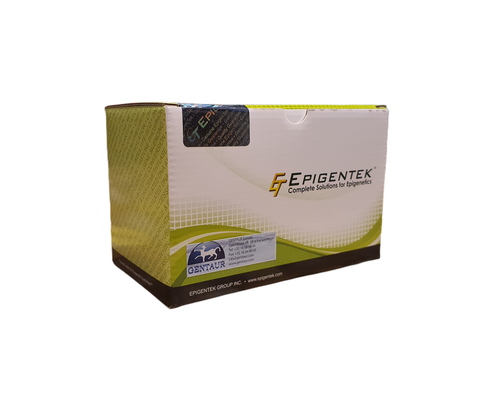Product Description
H3R17me2 (asym) | Histone H3 (asym-dimethyl Arg17) | AS16 3180 | Agrisera
Immunogen: KLH-conjugated synthetic peptide
Host: Rabbit
Conjugation: N/A
Clonality: Polyclonal
Isotype: N/A
Purity: Immunogen affinity purified serum.
Format: Liquid
Tested Application: Chromatin immunoprecipitation (ChIP), Immunofluorescence (IF), Western blot (WB)
Related Products: AS16 3168 | Anti-H3T3pK4me1 | Histone H3 (monomethyl Lys4, p Thr3), rabbit antibodies AS16 3169 | Anti-H3T3pK4me2 | Histone H3 (dimethyl Lys4, p Thr3), rabbit antibodies AS16 3172 | Anti-H3K4me3T6p | H3 (trimethyl Lys4, p Thr6), rabbit antibodiesAS16 3197 | Anti-anti-H3core, monoclonal antibodiesAS15 2855 | Anti-H3 | histone H3, chicken polyclonal antibodiesAS10 710 | Anti-H3 | histone H3, rabbit polyclonal antibodiesAS10 710PRE | H3 | histone H3, pre-immune serum to H3 antibody AS10 710collection of antibodies to epigenetics
Recommended Dilutions: 2-5 µg/million cells (ChIP), 1 : 50 (IF), 1 : 500 (WB)
Molecular weight: 15 kDa
Confirmed Reactivity: Caenorhabditis elegans, Human
Predicted Reactivity: Chicken, Drosophila melanogaster, Mouse, Plant, Rat, Xenopus sp.
Not reactive in: No confirmed exceptions from predicted reactivity are currently known
Additional Information: N/A
Background: Common histone modifications include methylation of lysine and arginine, acetylation of lysine, phosphorylation of threonine and serine, and sumoylation, biotinylation, and ubiquitylation of lysine. In particular, dimetylation of H3 Arg17 (H3 R17Me2) has been linked to gene activation. Coactivator-associated arginine methyltransferase-1 (CARM1) methylates Arg17 with its protein arginine methyltransferase (PRMT) catalytic core. Activation of this modification is linked to transcription hormone response promotors, as well as cell fate regulation. Interestingly, H3 methylation of R17 and R26 contributes to greater pluripotency potential of stem cells, while downregulation of this PTM increases differentiation.
Reconstitution: N/A
Storage: Store lyophilized/reconstituted at -20°C; once reconstituted make aliquots to avoid repeated freeze-thaw cycles. Please remember to spin the tubes briefly prior to opening them to avoid any losses that might occur from material adhering to the cap or sides of the tube.
TAIR Nnumbre: N/A
Category: Epigenetics/DNA methylation
Research Area: Epigenetics
 Euro
Euro
 USD
USD
 British Pound
British Pound
 NULL
NULL








